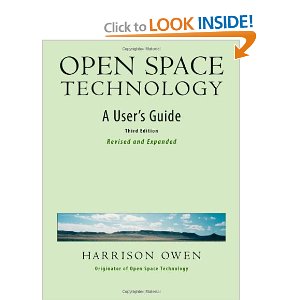Phi Beta Iota: Harrison Owen, inventor of Open Space Technology, is one of our most prized mentors. His core point above is that all systems are open and self-organizing — control is a pretense.
See Also:
Phi Beta Iota: Harrison Owen, inventor of Open Space Technology, is one of our most prized mentors. His core point above is that all systems are open and self-organizing — control is a pretense.
See Also:

This [ten-page] paper started as a note to myself as I sought to explore the disparity between my home here in Maine, the forest, lake, and loons…and the rushing maelstrom of the world about me that showed up in the instant on my computer screen.
Call it anxiety adjustment, therapy, or just an attempt to make some sense out of thing.
Perhaps it should have remained in that personal, private compartment, but I also felt the need to share, and so I have. You have to decide the wisdom of that decision.
Ho.
Harrison
Good show to In the Dark of the Night with the “Three Story lines” I find myself in substantial agreement with all that is said about the downsides. However I might put an additional twist on #1 – Changing Consciousness. It certainly can have the air of fantasy, especially when played in the mode of “The Age of Aquarius.” But the positive side might be that it has happened before on multiple occasions – so why not again? I think there is broad agreement that such shifts have happened, and not just in the esoteric community. Less agreement as to the exact phases and mechanisms of development (evolution) – and mild to wild arguments about the details. Developmental Psychologists, Anthropologists, Sociologists all have their schema – along with the esoteric community. It is even possible to do some useful comparative study, for example, Ken Wilbur’s The Spectrum of Consciousness (Quest Books, 1993)
The schema I offered (my take on the Great Chain) certainly falls at the low end of sophistication when compared to the other efforts, but it has been around a lot longer than all the rest which suggests a certain historical viability. And it was not my purpose to rewrite the history of consciousness, a task for which I have zero competence – but rather to get something on the table for discussion. Five Easy Pieces, as it were – you might say it was “good enough for government work.”
Anyhow, if shifts do take place, and the schema I offered is a rough approximation of the situation – why would that matter? One might argue that you simply had to fold your hands and wait for the inevitable to take place – and many people would do that – so why bother to even think about it? I think there are at least two reasons. First – when life gets confusing it is helpful if you can see the dreck as part of a process as opposed to mad randomness. I’m told that women experience this in the birthing process, each moment of which can seem like insane hell – and it is also an ordered sequence that gets you to a desired outcome (a baby). The second reason is that with some knowledge of the process, it may be possible to facilitate its progress, which of course is what a Midwife does, and Breathing helps.
You don’t design the process, can’t change it – No skipping of steps! But you can facilitate its flow. That is what happens in birthing. Could it also happen in the birthing of consciousness? Not just with each individual, one individual at a time, but all together, or at least in large groups? I think we have more than a few clues as to how that might happen – none of which include storming the walls of the ancient regime or convening the global design team. I think.
Ho.

Asked to comment on the preliminary abstract for a new article, below the line at Search: public administration in 21 century, Harrison responded as follows.
I like your story line, if only because you reach a conclusion that closely parallels one of my own. Coming off a very different base, I found myself convinced that we are at the cusp of a transformative moment, caught between a control oriented, rationalistic awareness (consciousness) of ourselves and our world, verging into an interactive, self organizing consciousness. And “cusps” are always painful and disorienting, which would seem to be an accurate, albeit mild, characterization of our times.
— extract from the end advanced here—
The real issue was that The Millennium Organization was not a “new program” – it was a profound paradigm shift. And if Thomas Kuhn has taught us anything it is that paradigm shifts are counterintuitive, painful and always the last thing that anybody in their right mind would care to do. Even worse shifting paradigms is not something you can think or reason yourself into. You can’t plan it, design it, program it, manage it, nor control it. The journey forward follows a very different route. I believe there are any number of useful approaches – but none of them come from the Old Proactive Toolbox. I think.
—read the full story—
Continue reading “Harrison Owen: Public Administration in the 21st Century”

John M. Owen
![]() Academic, Historical Focus on States
Academic, Historical Focus on States
March 4, 2011
In comparison to Grand Strategies: Literature, Statecraft, and World Order, which is receiving a 6+ from my (my top 10%), this is at best a 4 for the general public of which I am a part. It has its academic testimonials, in that world it seems to be a solid 5.
The author focuses on the period from 1510-2010 and on forcible regime change among polarized elites. While the author clearly states his intent to confront realism theory and to provide an alternative history over five centuries, the book leaves me bored and cold.
Ideas matter, the author tells us. He documents (most ably) three waves, three ideological struggles.
First wave 1520-1650, Catholic Church versus monarchs
Second wave 1770-1850, Monarchs versus republicans/constitutionalists
Third wave 1919 to date, Export of fascism, communism, and liberal democracy
Well said. And I rather suspect that the core of the matter is deeper than Culture – and that would be an extended conversation. But it is certainly not about rule change and redesign, I think.
Right on, as your imminent study of evolutionary psychology will confirm. I reckon we don't have time for evolutions in our Pleistocene genome to catch up to (and get ahead of) our impact on the planet, so we're just gonna hafta run what we brung. That means cultural engineering and we already have been shown how to do it by the Oligarchy. What's it gonna take to shift the values-balance from hegemonistic concentration at any cost to something closer to sustainability? But then, that's a whole ‘nother conversation barely touched-on in the message below…

Harrison Owen
![]() Low-Cost Priceless Guide Worth Hundreds of Thousands
Low-Cost Priceless Guide Worth Hundreds of Thousands
October 24, 2010
It's been my pleasure to know the author of this book ever since he hunted me down after my review of Wave Rider: Leadership for High Performance in a Self-Organizing World, and I have also had the benefit of being a participant in a number of Open Space sessions run by, among others, Peggy Holman, author of Engaging Emergence: Turning Upheaval into Opportunity and the older The Change Handbook: The Definitive Resource on Today's Best Methods for Engaging Whole Systems.
I cannot over-state the value of this book to anyone who has a complex and expensive problem but cannot afford to get the author there personally. While the book is no substitute for the genius, the intuition, the experience, and the sheer “quiet energy” that the author can bring to any endeavor, it is not just a starting point, it is more than enough to get you through your first self-organized event, and the results are sure to astonish as well as excite about the potential benefits of having the author lead the next session.
Here is how it works in a nut-shell, and I put this into the review because I am not happy with the minimalist marketing information the publisher has provided but happy that Look Inside the Book is activated–use that feature!
1) Everyone who cares is invited to a meeting in a space large enough to accommodate the group. Many events will charge a fee to cover the space, the food, and the travel costs of the facilitators, some events can be free especially if internal. HOWEVER, the diversity of who is invited (i.e. including outsiders, clients, journalists, the lowest ranking maintenance people), THIS MATTERS….A LOT.
Continue reading “Review: Open Space Technology: A User's Guide”